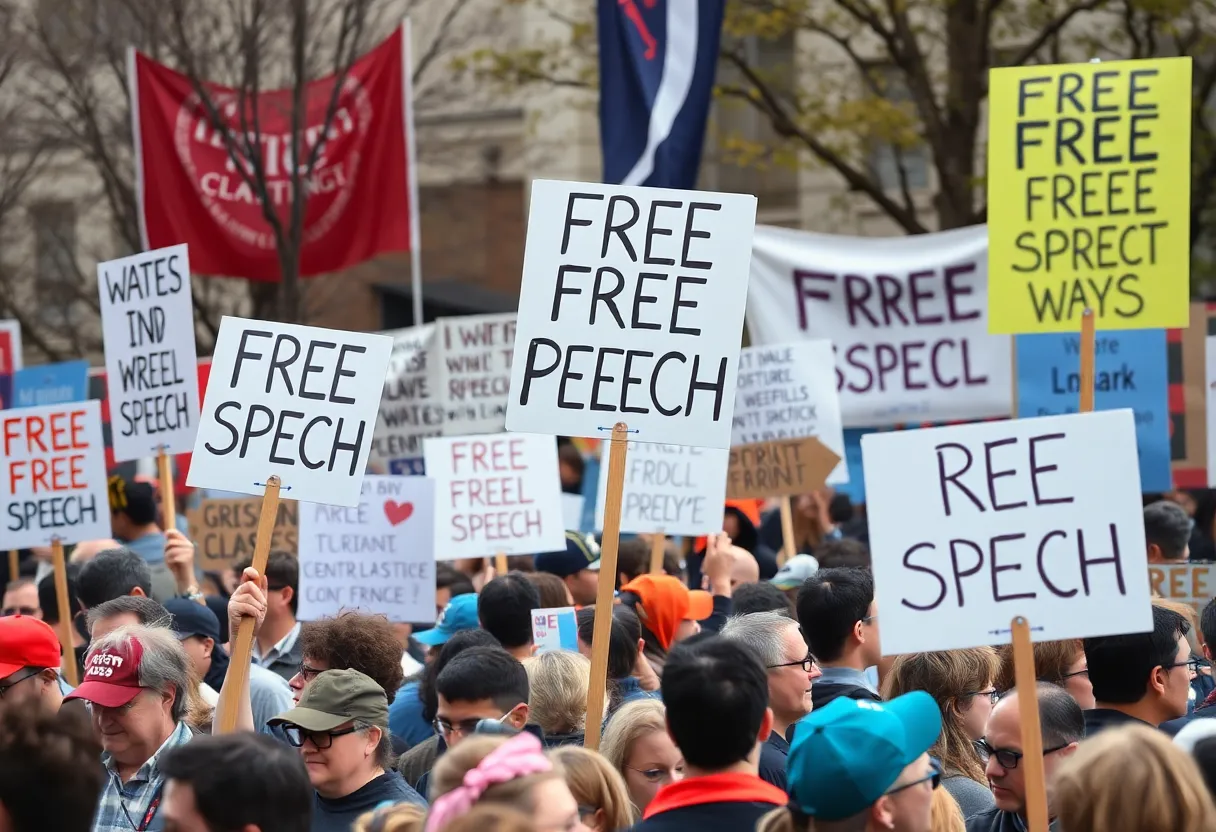News Summary
During a memorial for conservative activist Charlie Kirk, President Donald Trump praised him as a ‘great American hero’ but also made divisive comments about his opponents. This has triggered discussions around the implications of criminalizing dissent and the growing perception that speech is being treated as a form of terrorism. Critics argue that such rhetoric threatens free expression and reflects a troubling shift within the Republican party towards authoritarianism. The political discourse surrounding Kirk’s legacy highlights contradictions in conservative views on free speech.
Trump’s Remarks at Memorial Spark Free Speech Controversy
At a recent memorial for conservative activist Charlie Kirk, President Donald Trump hailed him as a “great American hero” and a “martyr” for freedom. This kind of praise isn’t unusual for Trump, but what followed in his speech stirred quite a bit of discussion. He acknowledged that he had some differences with Kirk’s philosophy, stating that he harbors strong feelings towards his opponents, expressing that “I hate my opponents, and I don’t want the best for them.”
This comment seems to reflect a broader trend in today’s political climate—a trend that suggests **criminalizing dissent** and creating a blurry line between critique and treason. The heat is on, and speech is increasingly being framed as a form of terrorism, leading to a chilling atmosphere filled with surveillance where even satire is labeled as enemy propaganda.
In workplaces across the nation, employees are feeling the squeeze as they face repercussions for personal posts on social media. This crackdown on free expression sends hints of a more significant issue at play—what some are calling an attack on the freedom to speak.
Trump’s controversial statements go beyond mere political banter. His reportedly false claims linking paracetamol and autism could very well have negative implications for public health, yet they rally his base against the scientific community. This approach reflects how words can be weaponized against critics, showcasing Trump’s methods of using speech to vilify dissenters.
There are whispers that Trump may take it a step further. He has hinted at the possibility of revoking broadcasting licenses from networks he believes treat him unfairly. He even applauded the indefinite suspension of Jimmy Kimmel from ABC, considering it a justified action.
Critics are sounding the alarm on what they see as a dangerous move toward authoritarianism, potentially undermining the First Amendment. The former Fox News host Tucker Carlson has spoken out against the introduction of hate speech laws, warning they might lead to civil disobedience.
Trump’s actions suggest a major shift in Republican identity as he pressures critics and stirs up a punitive culture against opposition—all while wrapping it in the banner of free expression. This change in the party is creating a divisive atmosphere where dissent is viewed less as an essential part of democracy and more as a threat to be silenced.
Even within the ranks of his party, opinions differ. Republican Senator Ted Cruz has labeled FCC official Brendan Carr’s remarks regarding Kimmel as “dangerous”, pointing out that it poses a threat to free speech. Critics are concerned that the ongoing fight against hate speech could also serve as a tool to stifle political opposition and dissenting voices.
From the Oval Office, Trump hinted at the notion that critical media coverage might be considered illegal speech, revealing his frustration over what he regards as unfair portrayals by the media. Prominent conservatives have celebrated actions against those who dare to criticize them, drawing attention to a troubling double standard in defending free speech.
In the end, the political discourse surrounding Kirk’s legacy sheds light on the contradictions within conservative views on free speech and public debate. As the dynamics of conversation continue to evolve, the impact on America’s long-standing traditions regarding free expression remains a hot topic.
FAQs
- What did Trump say about Charlie Kirk at the memorial? At a memorial for conservative activist Charlie Kirk, President Donald Trump called him a “great American hero” and “martyr” for freedom.
- What trends have emerged regarding dissent? Trump’s speech reflects a trend of criminalizing dissent and blurring the boundaries between critique and treason.
- How is speech being framed in today’s political climate? Speech is increasingly framed as terrorism, and satire is labeled as enemy propaganda, leading to a chilling climate of surveillance.
- What actions are being taken against employees for personal posts? Employers are punishing workers for personal posts, suggesting a broader crackdown on free expression.
- What concerns have been raised about hate speech laws? Critics fear that the ongoing campaign against “hate speech” will also target a range of political opposition and dissenting voices.
Deeper Dive: News & Info About This Topic
- AP News: Trump’s Remarks Spark Free Speech Controversy
- Wikipedia: Freedom of Speech
- New York Times: Trump and Free Speech
- Google Search: Trump Free Speech Controversy
- Fortune: Rupert Murdoch on Trump’s Free Speech Case
- Encyclopedia Britannica: Free Speech
- Politico: Trump and Free Speech Issues
- Google News: Trump Free Speech Issues
- Reuters: Kirk’s Death and Free Speech Firestorm

Author: STAFF HERE PROVIDENCE WRITER
The PROVIDENCE STAFF WRITER represents the experienced team at HEREProvidence.com, your go-to source for actionable local news and information in Providence, Providence County, and beyond. Specializing in "news you can use," we cover essential topics like product reviews for personal and business needs, local business directories, politics, real estate trends, neighborhood insights, and state news affecting the area—with deep expertise drawn from years of dedicated reporting and strong community input, including local press releases and business updates. We deliver top reporting on high-value events such as WaterFire, Rhode Island International Film Festival, and Rhode Island Comic Con. Our coverage extends to key organizations like the Greater Providence Chamber of Commerce and Providence Warwick Convention & Visitors Bureau, plus leading businesses in finance and manufacturing that power the local economy such as Citizens Financial Group and Textron. As part of the broader HERE network, we provide comprehensive, credible insights into Rhode Island's dynamic landscape.





